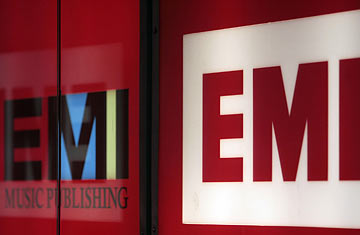
EMI headquarters in London
Katy Perry may have turned up to EMI's post-Grammys party in a revealing silver dress, but even the "I Kissed a Girl" singer (who is signed to Capitol Records, a subsidiary of EMI) could not monopolize all the attention. Despite the lavish affair at the W Hotel in Hollywood, EMI is in desperate financial trouble. So deep, in fact, that some were wondering how it could afford to host a party at all.
A few days after last month's Grammy Awards, Terra Firma, the venture-capital firm that owns EMI, announced that the record giant had lost nearly $2.5 billion last year. Not only that, a brick wall looms: EMI has to raise more than $200 million in the next six months to ensure that it does not fall into the hands of Citigroup — the bank that lent Terra Firma, controlled by British financier Guy Hands, the cash to buy it 2½ years ago.
Given that finances are so tight, it is hardly surprising that EMI executives aggressively reminded journalists that the Grammy party did not cost the company a penny, thanks to sponsorship deals with the likes of Samsung and Xbox. The concern is an indication of how far EMI has fallen since the days when the Spice Girls topped the charts. The world's fourth largest record company, which also has the Beatles and Coldplay on its books, can't afford — or rather can't be seen as being able to afford — its own party.
EMI's financial problem is simple. When Hands bought the 113-year-old British company in August 2007 — just before the credit crunch hit — both he and Citigroup expected he'd be able to finance the $4.2 billion in debt he'd taken on to close the deal. Hands also believed he could quickly turn around EMI's long-struggling record division.
Since then, the company's finances have improved marginally. The record division made nearly $250 million in underlying profit in the fiscal year 2009, while the company's music-publishing arm, which oversees songwriters, generated $208 million. Both profits, though, were wiped out by massive write-downs, which created a largely paper loss of $2.4 billion. "With that level of debt in the business, the reality is that EMI is now almost worthless," says Simon Dyson, editor of the London-based industry newsletter Music & Copyright.
This fiscal year, aided by sales of 13 million rereleased Beatles albums, EMI's record division is expected to make $312 million, with the publishing sector bringing in an additional $218 million. That will cover Terra Firma's interest bill of about $350 million. But it's not enough to keep Citigroup happy — the bank had agreed to lend the venture-capital firm $4.2 billion only if EMI could hit certain performance targets. As EMI's accounts dolefully note, there is a "significant shortfall" between the profit likely to be generated in 2010 and the target previously agreed upon.
Hands, now living as a tax exile on the island of Guernsey in the English Channel, needs to inject about $200 million into the business by the summer; otherwise, Citigroup gets the keys. His allies say he can raise the money from third-party investors, but that is only enough to keep EMI out of the bank's hands for 12 more months. What Hands really needs is a deal with Citigroup to slash EMI's debts. But like any good band in crisis, Hands and his onetime partners at Citigroup have fallen out.
Last summer, Hands proposed a deal in which he would inject $1.56 billion into EMI if Citigroup wrote off about the same amount in debt. Citigroup said no and offered instead to write off $1.56 billion in debt in return for controlling ownership of the company. Hands refused and then sued Citigroup, claiming the bank had persuaded him to pay too much for EMI in the first place. Now the two sides aren't speaking. Hands says Citigroup is playing "hardball for no good reason," while the bank feels that Hands is being unrealistic in his demand to remain in control.
Meanwhile, one possible buyer lurks on the sidelines: Warner Music, the third largest record company in the world. CEO Edgar Bronfman has long coveted EMI, but mutual intransigence has thus far prevented a merger. Some Terra Firma officials fear that Citigroup simply wants to "flip" EMI by making a quick sale to Warner — a plan Citigroup denies. In its present state, however, EMI's future as an independent company is far from certain. "The trouble is that the future of EMI would look quite good if it wasn't for all the debt," Dyson says. "But it doesn't look like Terra Firma has a chance of hanging on in the current circumstances." There will probably be far fewer champagne parties in the future.
